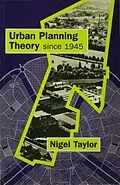Following the Second World War, modern systems of urban and regional planning were established in Britain and most other developed countries. In this book, Nigel Taylor describes the changes in planning thought which have taken place since then.
He outlines the main theories of planning, from the traditional view of urban planning as an exercise in physical design, to the systems and rational process views of planning of the 1960s; from Marxist accounts of the role of planning in capitalist society in the 1970s, to theories about planning implementation, and more recent views of planning as a form of `communicative action'.
Autorentext
Nigel Taylor is a Senior Lecturer in the School of Planning and Architecture, Faculty of the Built Environment at the University of the West of England, Bristol.
Inhalt
PART ONE: EARLY POST-WAR PLANNING THEORY
Town Planning as Physical Planning and Design
The Values of Post-War Planning Theory
Early Critiques of Post-War Planning Theory
PART TWO: PLANNING THEORY IN THE 1960S
The Systems and Rational Process Views of Planning
Planning as a Political Process
PART THREE: PLANNING THEORY FROM THE 1970S TO THE 1990S
Theory about the Effects of Planning
Rational Planning and Implementation
Planning Theory after the New Right
PART FOUR: CONCLUSIONS
Paradigm Shifts, Modernism, and Postmodernism
